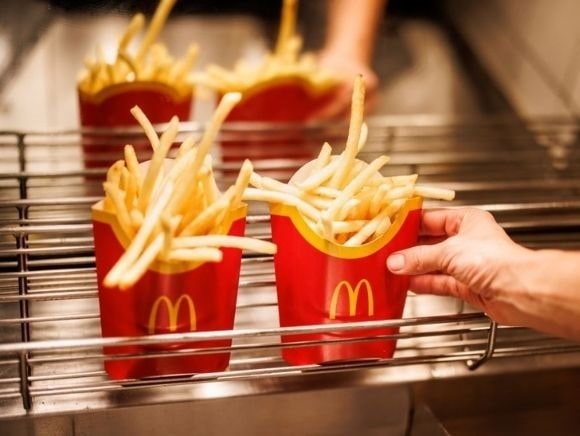A new crinkle has been added to the global supply chain crisis: potatoes. It has not been a spud-tacular 12 months in the international economy, with shipping container shortages and port backlogs causing notable scarcity in many sectors of the marketplace. But while White House Press Secretary Jen Psaki might dismiss today’s situation as a “tragedy of the treadmill,” a new melodrama involving McDonald’s delicious French fries is unfolding in Japan. Cue the soap opera organ sting and howl to the moon: Oh, the humanity!
Would You Like Fries With That?

(Photo by Matthias Balk/picture alliance via Getty Images)
McDonald’s is doing the unthinkable in Asia’s largest market for U.S. frozen potato products. The fast-food titan and enabler of clogged arteries had been forced to ration its scrumptious fries because a blend of COVID-19, a protracted labor dispute, and intense flooding in Western Canada is impacting the worldwide potato market.
“Due to large-scale flooding near the Port of Vancouver … and the global supply chain crunch caused by the coronavirus pandemic, there are delays in the supply of potatoes,” McDonald’s Japan said in a statement, adding that it would stop selling large- and medium-sized fries.
The home of the Quarter-Pounder With Cheese is ensuring that patrons can still order fries but in only small-sized portions moving forward. McDonald’s Japan, which has more than 3,000 locations, is now importing 1,000 tons of frozen fries by air. Does this mean other businesses that specialize in potatoes are experiencing the same issues?
Indeed, it is not only McDonald’s that is grappling with a potato problem. Kentucky Fried Chicken locations across Kenya eliminated French fries from the menu, citing shipping delays by key trading partners. Instead, customers can substitute the popular side dish for other menu items, such as coleslaw, soda, chicken, and ugali. Or, if fast-food connoisseurs wish, they can also head over to a Kenyan Burger King and purchase a plate of fries to complement their KFC meal.
Late last year, it also was reported that McDonald’s temporarily stopped selling milkshakes at its locations in England, Scotland, and Wales because of a lorry driver shortage. “Like most retailers, we are currently experiencing some supply chain issues, impacting the availability of a small number of products,” the corporation stated.
Keeping Your Eyes Peeled for a Miracle
On the one hand, potato supply setbacks can be problematic with or without a pandemic. From labor disruptions to lousy weather conditions, a whole host of factors could weigh on the vegetable in any economy. On the other hand, this is a multi-faceted problem that could linger for a long time.
For example, in South Africa, potato farmers and product makers warned that a terrible frost and excessive rainfall contributed to minuscule local yields. Or, in another instance, in Canada, which recently saw its potato output surge more than 15% over the last year, the flooding in British Columbia led to export delays at the Port of Vancouver.
 Atlantic Canada is also enduring a so-called potato export crisis. The Canadian Food Inspection Agency (CFIA) implemented a trade ban in November as part of a response to U.S. concerns over potato warts discovered in two growing areas in Prince Edward Island. This has substantially squeezed farmers.
Atlantic Canada is also enduring a so-called potato export crisis. The Canadian Food Inspection Agency (CFIA) implemented a trade ban in November as part of a response to U.S. concerns over potato warts discovered in two growing areas in Prince Edward Island. This has substantially squeezed farmers.
Last year, in the United States, farmers had to destroy millions of potatoes as the nation’s response to the pandemic-decimated demand. Plus, according to the U.S. Department of Agriculture (USDA), America’s potato production slumped by nearly 2% in 2021. Globally, output in the 2020-2021 marketing season was up a tepid 3%.
Still, prices have not responded accordingly. The Bureau of Labor Statistics (BLS) consumer price index (CPI) report from November noted that potato prices dipped at an annualized rate of 0.2%. But this could change in the following monthly snapshots of the cost of living in the United States.
That’s Spud Life
The latest global supply chain crisis victim shows how this problem is not vanishing. From economists to industry experts to consumers, the consensus is that shortages, backlogs, traffic jams, and skyrocketing global demand are not dissipating anytime soon. Everyone might have a chuckle that McDonald’s has to halt selling orders of large fries, but it is a symptom of a more significant issue that is crushing many corners of the market, from pharmaceuticals to energy. That said, as long as the world has its Big Macs and coffee, consumers can survive anything.
~ Read more from Andrew Moran.




